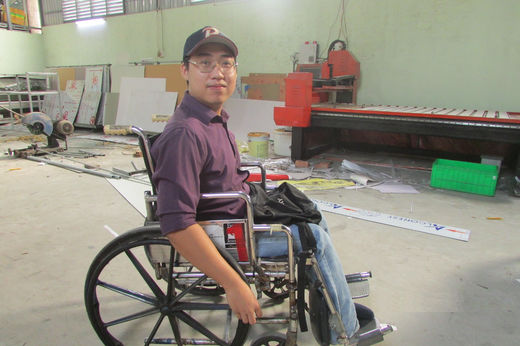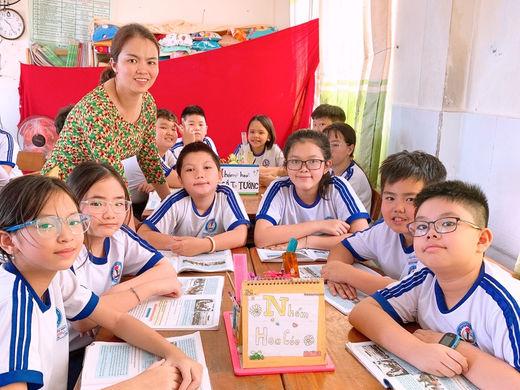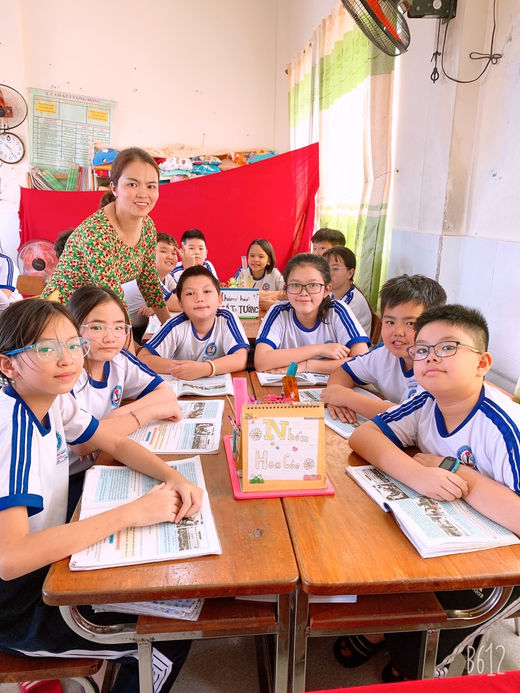Background:
The evaluation aims to assess impact of the NMAV funded project for Social Inclusion in Can Tho from 2016-2020 and Inclusive Education (IE) for persons with disabilities and children with disabilities in Can Tho and in Hau Giang from 2018-2020.
Key partners have been Can Tho Association for Persons with Disabilities (CAPD), Can Tho Department of Labour Invalid and Social Affair and Department of Education and Training (DOET) in Can Tho and Hau Giang.
Here are some of the key findings and recommendations from the report:
The project succeeded in empowering people with disabilities. The project interventions have brought positive changes for PWDs, raising awareness on their abilities, their rights and building their capacities to manage and to organize themselves, and to better quality of life through livelihood models. 51 training courses was held for 1,345 persons, plus individual peer counselling and communication events.
Awareness of local authority and communities: The evaluation found that local authorities have changed their behavior and started supporting PWDs by for instance allowing them to use meeting rooms for their club meetings, by providing free booths for selling their products produced, or by issuing motorbike license to person with hearing impairment. Vice chairman of Ninh Kieu People Committee said “The most significant contribution of the project is that it has changed our views and our sense of responsibility. I realize that we did not do our job well enough.”
Vocational and management training, livelihood support and access to revolving fund have impacted on the quality of life. The project organized three trainings on graphic design, one sewing training and many courses on business planning and management. A beneficiary told that: “I opened a small shop a year ago. After the training, I knew how to prevent risks and had strategies for stocking inventory. When the covid pandemic, I moved to online sale. So far, the revenue has increased by 10%”.

Mr. L. H. P a project beneficiary said: I am paraplegia. My parent broke up when I was a child. I have been living with my grandparent. In 2016, I was invited to be Can Tho DPO member and took part in some awareness raising activities. In 2017, through the project social inclusion for PWDs funded by NMAV, I was selected together with 5 members to a graphical design course. We studied and practiced at DC graphical design company for 8 months including 480 hours training on basic computing skills (World, Excel, PowerPoint), illustrator, photoshop, CorelDraw, lay-out, color, customer psychology, outdoor advertisement (banner, sign plate…). After graduation, I’ve worked as a designer in Thuan Phat ADV design company. The company has paid me a competitive salary and also provided social insurance, health insurance and annual bonus. Moreover, the company adjusted the aisle for my wheelchair accessibility. Now I can save at least 40usd per month for my future plan. This project gives me opportunity for a good job with a stable income. Working for a professional company, I have chance to meet with many people such as clients, providers, colleagues and improve my personal skills. Also, I was assigned to study 3D which is an advance designing in 3 months for future promotion. I feel very happy and confident. Now I don’t see my disability as a barrier in my career development.
The project was successful in raising awareness and building capacity of teaches and managers on Inclusive Education: 30 training courses for 953 teacher and managers was organized on topics such as teaching methodologies, how to develop individual education plans, disability and equality and so forth. A line manager of Can Tho DOET said that “The project has successfully changed the awareness and behavior of the teachers, school managers, and myself on IE. Few years ago, some school managers called me to refuse the enrollment of CWDs, but in the last two years, I do not receive such kind of calls”.
Ms. L. H. N. K, a teacher at a Special School said: “The first training course I joined in June 2018 was Disability and Equality. Since then, I have attended more trainings and workshops. My colleagues and I have gained useful knowledge and skills in teaching children with disabilities such as making individual education plan, examine children with autism by PEP 3, early intervention teaching skills for CWDs, etc. I have a chance to consolidate knowledge about intervention and education for children with hearing impairment as well as have more in-depth knowledge about types of disabilities like intellectual disabilities or autism. I know how to use tools to examine children with disabilities; make individual education plan for children who have special needs; organize sharing sessions on awareness raising and capacity building for parents having children with disabilities; share new knowledge with colleagues. Before I just taught early intervention for children with hearing impairment, now my colleague and I are applying early intervention for 4 children with different types of disabilities including two children with autism, a child with intellectual disability, and a child with multi- disabilities.”

Ms. N. H. N. – Teacher of Primary School said: “The most important change is my perception of inclusive education. Before joining the project, I myself taught many pupils with disabilities, but I only taught instinctively because of no guideline books of teaching CWDs and no progress of CWDs. When participating in the project, I not only taught pupils with disabilities directly but also gave advise for teachers having pupils with disabilities in next transition. I myself noticed a positive change from the children, the family.”
Apart from positive changes created by the project, there were some challenges.
PWDs and their caregivers lacked understanding of their rights and sometimes reinforced their own negative beliefs on the abilities and independence of PWDs. Infrastructure at some Commune People Committee buildings are still not accessible for PWDs.
Teachers who did not attend the project trainings, misunderstood about Inclusive Education and considered the development of Individual Education Plan as “extra paperwork and workload”. The limited and inactive participation of the rectors in the project trainings prevented them from good understanding on IE, resulting in limited coaching on IE for other teachers.
Transforming the Special School into an Inclusive Education Resource Center has been a challenging issue since it depends on the external decisions of local authorities and financial autonomy of the Special School. However, the Special School has succeeded in starting some IE components through the project, and the process is still ongoing.
Key Recommendations:
- The project should continue to build capacity for CAPD so that it can become a leading association of PWD and support social inclusion for PWD in Mekong region.
- The project should continue to do Social Inclusion interventions such as peer consultations for PWD and livelihood models.
- The project should improve its M&E system via collecting impact of the training after three or six months to monitor behavior changes of the target groups.
- The project should continue to organize capacity building activities for teachers and managers.
- The project should continue to improve the awareness and participation of parents of CWD in relevant IE activities.
- The project should strengthen the partnership with Department of Labor, Invalids and Social Affairs (DOLISA) and Department of Education and Training (DOET) in Can Tho city so that these local authorities will more proactively support the project.
Learn more about INCLUSION OF PEOPLE WITH DISABILITIES
